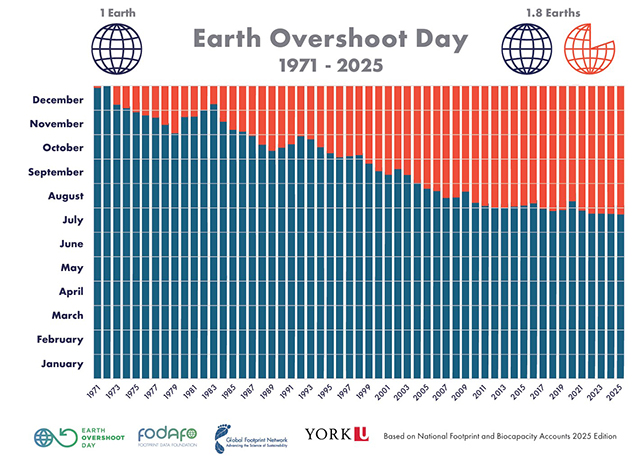
 Earth Overshoot Day is coming faster every year
Earth Overshoot Day is coming faster every year
Humanity is consuming natural resources 1.8 times faster than Earth can regenerate, with this year’s Overshoot Day falling earliest on record, calling for an urgent need for systemic reform
July 24th marked this year’s Earth Overshoot Day, the date when humanity’s demand on nature surpasses Earth’s capacity to replenish nature during the entire year.
Calculated by Global Footprint Network, the international sustainability organisation that pioneered the Ecological Footprint, this date is based on the National Footprint and Biocapacity Accounts maintained by York University.
Earth Overshoot Day falling on July 24th means that humanity is currently using nature 1.8 times faster than Earth’s ecosystems can regenerate.
This overshoot occurs because people emit more CO2 than the biosphere can absorb, use more freshwater than is replenished, harvest more trees than can regrow, fish quicker than stocks replenish, etc.
This overuse beyond what nature can renew inevitably depletes Earth’s natural capital. It compromises long-term resource security, especially for those who already struggle to access the resources needed to operate.
Overshoot isn’t just the driver behind biodiversity loss, resource depletion, deforestation, and the buildup of greenhouse gases in the atmosphere, which intensifies extreme weather events.
It also fuels stagflation, food and energy insecurity, health crises, and conflict. Regions, cities, companies, and countries that have not prepared for this predictable reality face significantly higher risks.
Although this year’s Earth Overshoot Day is the earliest ever, it has remained within a narrow window for over 15 years, consistently occurring just after 7 months of the year have passed.
The remainder of the year humanity lives by depleting the planet further. Therefore, even as the date holds steady, the pressure on the planet intensifies because the damage from overshoot is cumulative.
Every year’s deficit spending adds to the already existing ecological debt.
From an economic perspective, overshoot is a clear example of a market failure. Such failures hurt everyone.
It poses a direct threat to overusers, who depend on large volumes of underpriced resource inputs that become increasingly scarce as the market failure persists.
If uncorrected, such market failures stimulate overuse which then leads to disruptions or economic shocks.
The market failure also represents an economic loss for biocapacity providers, who are not adequately compensated.
For overshoot to end by design, rather than by disaster, this market failure must be corrected.
Solutions are available and financially advantageous. Opportunities exist in five key areas: Cities, energy, food, population, and planet.
The Power of Possibility highlights over 100 options that move Earth Overshoot Day.
For example, cutting CO2 emissions from fossil fuels by 50 per cent would move the date by three months.
There are also businesses that move the date as they expand. Such businesses may be the ones best positioned to gain value in a future of climate change and resource constraints.
According to Dr Lewis Akenji, board member of Global Footprint Network: "We are stretching the limits of how much ecological damage we can get away with. It is now a quarter into the 21st century and we owe the planet at least 22 years of ecological regeneration, even if we stop any further damage now. If we still want to call this planet home, this level of overshoot calls for a scale of ambition in adaptation and mitigation that should dwarf any previous historical investments we have made, for the sake of our common future."
Dr Paul Shrivastava, Professor at Pennsylvania State University and Co-President of the Club of Rome, comments: "Earth Overshoot Day reminds us that humanity is overconsuming by borrowing from the future. Unchecked, this will lead to default as the environment will be too depleted to offer everything people need. Avoiding financial and ecological default depends on our ability and willingness to pay back the debt."
He adds: "The good news is that avoiding ecological default is possible: We have the economic ability. Let’s now develop the political willingness from individual consumer behavior all the way up to governments’ economic strategies."
Meanwhile, Dr Mathis Wackernagel, Global Footprint Network co-founder and board member, states: "Because of the nature of physics, overshoot cannot last. It will end either by deliberate design or dumped-on disaster. It should not be too hard to choose which one is preferable, particularly in light of so many possible choices."
By Abdulaziz Khattak









































































